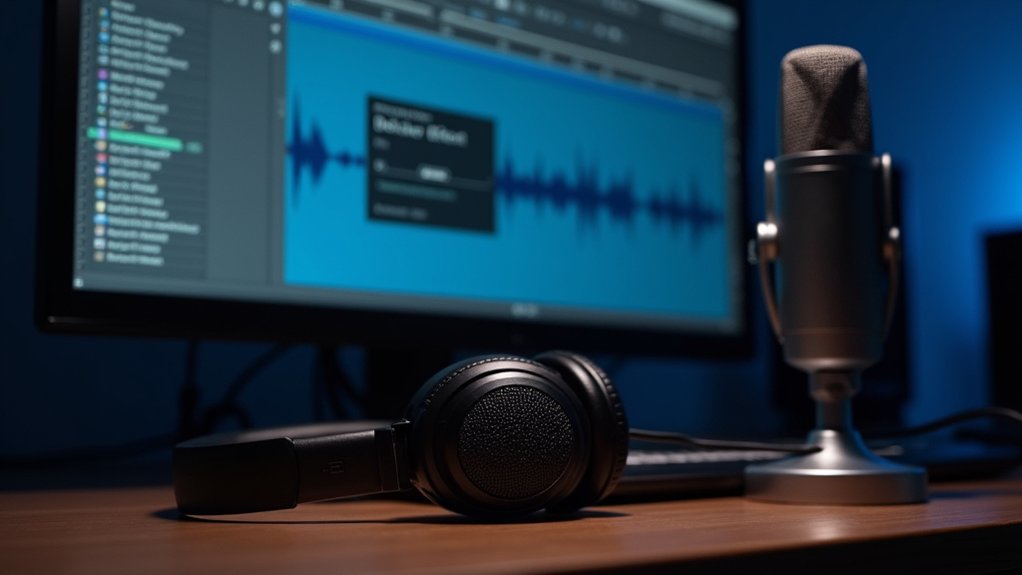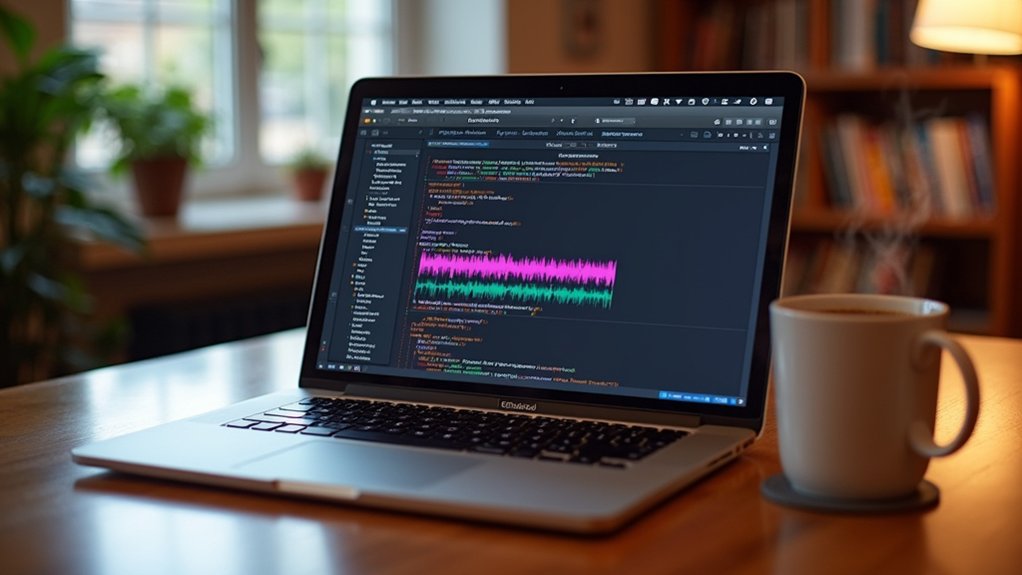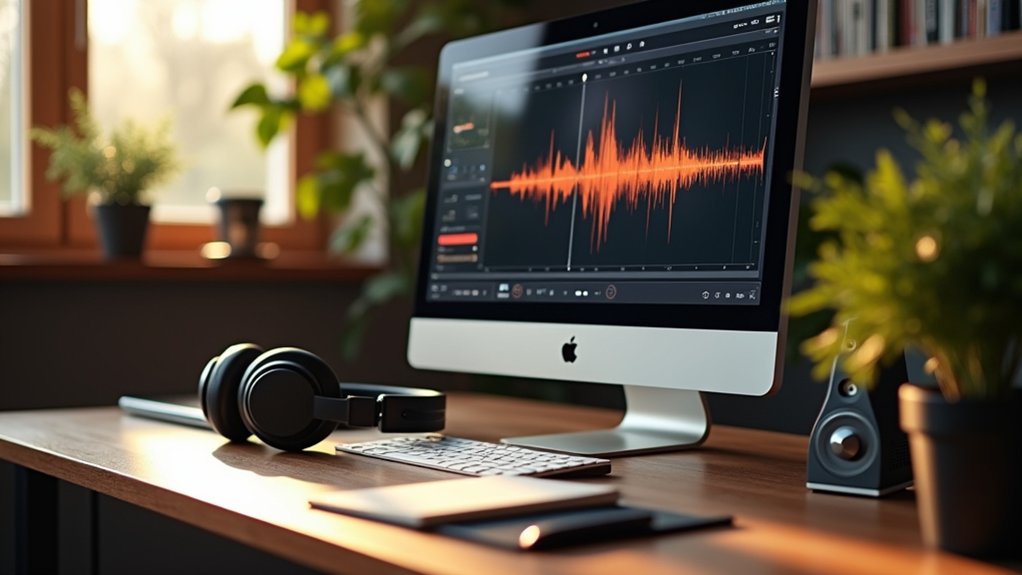Audacity is not considered spyware by technical standards. After the Muse Group acquisition, privacy policy changes raised concerns, but evidence shows the software only gathers limited, anonymized technical data, with telemetry features disabled by default. No personal identifiers or unencrypted IP addresses are collected. Data sharing with third parties and law enforcement is possible, but user consent and minimal collection are prioritized. Those interested in privacy risks and protection strategies can gain further clarity in the following sections.
Key Takeaways
- Audacity is not spyware; it only collects limited, anonymized technical data with telemetry features disabled by default.
- No personal identifiers (like names or unencrypted IP addresses) are collected, and data is not used for targeted advertising or profiling.
- Telemetry is optional, requires user opt-in, and users can self-host data or block Audacity’s internet access for extra privacy.
- Community backlash led to greater transparency and policy revisions, with user concerns driving ongoing privacy improvements.
- Users under 13 are restricted from online features for legal compliance, but offline use remains unaffected by data collection concerns.
Understanding the Audacity Privacy Policy Changes
Recently, Audacity’s privacy policy underwent significant revisions, prompting scrutiny regarding the extent and nature of user data collection.
The updated privacy policy clarifies that while data collection is limited—primarily to IP addresses and non-personal usage statistics—no personal identifiers such as names are gathered.
The policy outlines circumstances under which collected data may be shared, including with law enforcement or prospective business buyers, and specifies that European user data is stored within Europe but may be shared with Russian partners for security monitoring.
Telemetry, including session identification and usage statistics, remains disabled by default in compiled versions, rendering these data collection features optional.
Additionally, an age restriction prohibits users under 13, aligning with data protection regulations.
Community feedback has directly influenced these privacy policy changes, enhancing transparency.
What Data Does Audacity Actually Collect?
Audacity’s data collection is limited to anonymized technical information, such as IP addresses and user-agent details, with no direct personal identifiers stored.
According to its privacy policy, European user data is kept within Europe, while select data may be shared with a Russian security partner as mandated by law.
Telemetry remains opt-in, and the developers assert that no collected data is sold or used beyond operational needs.
Types of Data Collected
Data collection within Audacity is limited in scope and primarily centers on non-identifiable technical information, such as IP addresses (hashed for privacy), browser user-agent strings, and general geographical location.
Audacity does not collect direct identifiers like names or contact details, reducing the risk of personal identification from the collected data. These collecting practices are oriented toward software improvement, with telemetry features clearly marked as optional and disabled by default in standard compiled versions.
Importantly, individual IP addresses undergo hashing, providing an additional privacy safeguard. The data collected is not intended for targeted advertising or profiling.
Audacity’s privacy policy clarifies that only legally required information is shared with authorities, and users under 13 are excluded to comply with data protection regulations, reinforcing a conservative data-gathering approach.
Data Storage Practices
How exactly is user data handled within the Audacity ecosystem? Audacity’s data storage practices are outlined in its privacy policy, which details the minimal yet targeted user data collection.
Evidence indicates Audacity does not require personally identifying information; instead, it processes limited metadata such as hashed IP addresses, browser user-agent strings, and broad geographic location.
Significantly, telemetry is disabled by default, and users can opt out of any optional data sharing. For clarity, consider these technical highlights:
- IP addresses are not stored in full; instead, hashed versions are retained to limit traceability.
- Data from European users is kept within Europe, but some monitoring data may be shared with Russia for security.
- The privacy policy permits sharing with law enforcement and business partners as legally required.
Sharing and Retention Policies
While privacy concerns have prompted scrutiny of many open-source projects, the data actually collected by Audacity is limited in scope and function. According to its privacy policy, Audacity gathers minimal personal data—mainly IP addresses and usage statistics—primarily for software updates and diagnostic purposes. Individual IP addresses are encrypted using hashing, and direct identifiers such as names or contact details are not stored. Audacity’s sharing and retention policies specify that data may be disclosed to staff, law enforcement, or potential business buyers, but not sold or broadly harvested. Telemetry features remain optional and disabled by default, with expanded self-hosting options to increase transparency. The table below summarizes key data collection parameters:
| Data Type | Purpose | Retention Policy |
|---|---|---|
| IP Address | Error Reporting | Hashed, Limited Time |
| Usage Statistics | Software Improvement | Optional, User-Controlled |
| Session IDs | Telemetry/Updates | Optional, Encrypted |
The Role of Muse Group and Community Concerns
Following Muse Group’s acquisition of Audacity in April 2021, the project underwent significant policy changes that have drawn scrutiny from the open-source community regarding user privacy and data handling.
The revised privacy policy allows for sharing user data with law enforcement and entities in various jurisdictions, including Russia, which has triggered debates about data security and user trust.
Community responses have included calls for greater transparency, and in some cases, suggestions to fork Audacity to better safeguard user data in line with open-source values.
Notable aspects of the situation include:
- Muse Group’s policy updates expanded data sharing capabilities, heightening privacy risks.
- Community backlash prompted clarifications and revisions to the privacy policy.
- Ongoing discussions consider alternative solutions, such as software forks, to guarantee user privacy.
Telemetry Features: Opt-In or Opt-Out?
Audacity’s telemetry features are disabled by default in standard builds, requiring users to actively opt in if they wish to share usage statistics or error reports.
This approach grants users explicit control over whether any diagnostic data is transmitted, with further flexibility provided by the option to self-host telemetry endpoints.
Evidence indicates that the transmitted data is anonymized and excludes personally identifiable information, aligning with user privacy expectations.
Default Telemetry Settings Explained
Although concerns about software telemetry are common, compiled versions of Audacity come with telemetry features disabled by default, ensuring that no data is collected unless users explicitly opt in.
This approach to default telemetry settings means that Audacity is not collecting such data from users without their informed consent. The telemetry system, when enabled, only gathers non-personal usage statistics, and the privacy policy confirms that no personal identifiers or unencrypted IP addresses are stored.
Transparency and user trust are further supported by options to self-host telemetry data, reducing third-party involvement.
Key points regarding Audacity’s default telemetry settings include:
- Telemetry is off by default in official compiled builds.
- Only non-personal, anonymized data is collected if enabled.
- Users retain the ability to configure or self-host telemetry data.
User Control Over Data
How can users retain control over their data when using Audacity?
Audacity’s current telemetry features are designed with user control over data as a central principle. By default, telemetry is disabled in compiled versions, requiring explicit user opt-in for any data collection.
If enabled, the telemetry collects only session identification and usage statistics—without gathering personal identifiers, as outlined in Audacity’s privacy policy. Users can easily opt out, ensuring no technical or behavioral data is transmitted without consent.
The company’s response to community backlash led to revised policies, including the option for users to self-host telemetry data, enhancing transparency and trust.
Evidence shows that Audacity’s approach prioritizes user consent and privacy, minimizing risk by restricting data collection to technical metrics essential for software improvement.
Law Enforcement Requests and International Data Sharing
Several provisions in the updated privacy policy indicate that user data associated with Audacity may be disclosed to law enforcement agencies in response to legal requests.
This aspect of law enforcement cooperation is further complicated by international sharing agreements. Data, while primarily stored in the European Economic Area, may be shared with entities in other countries, including Russia, raising legitimate privacy concerns.
The policy asserts that no directly identifiable personal information such as names or contact details is collected, but technical data—such as hashed IP addresses—can still be shared under specific legal circumstances.
- Data sharing may occur with state regulators and law enforcement under legal compulsion.
- International sharing extends to jurisdictions beyond the EEA, including Russia.
- IP addresses are encrypted via hashing before any potential disclosure.
Age Restrictions and Their Impact on Users
With the recent update to Audacity’s privacy policy, explicit age restrictions now prohibit users under 13 from accessing the software online, aligning with international data protection laws such as COPPA and GDPR.
This change in the privacy policy is a direct response to legal requirements surrounding data collection from minors, aiming to mitigate risks related to unauthorized data processing.
The introduction of age restrictions enhances compliance and user safety, but also shifts the risk environment by potentially limiting access for younger users.
Importantly, offline use remains unrestricted by age, providing a pathway for continued access without online data exposure.
However, the PG-13 rating and enforcement of these age restrictions have prompted debate within the user community about the balance between regulatory compliance, accessibility, and trust in Audacity’s evolving user experience.
Open Source Principles Versus New Policy Direction
Although Audacity has long been recognized as a flagship open-source audio editor, its acquisition by Muse Group in 2021 and subsequent privacy policy revisions have introduced policy directions that some users argue conflict with foundational open-source principles.
The new privacy policy’s data collection provisions, including potential data sharing with law enforcement and the prohibition of users under 13, have raised questions about the alignment with open source principles such as transparency, user autonomy, and unrestricted access.
Key points of contention include:
- Data Collection and Sharing: The new privacy policy allows collecting IP addresses and sharing data with authorities, challenging open-source expectations of privacy.
- Age-Based Restrictions: Banning users under 13 contradicts the open-source ethos of universal accessibility.
- Community Response: Concerns have fueled calls for software forks to preserve original open-source integrity.
Evaluating Alternatives to Audacity
When evaluating alternatives to Audacity, users can select from a range of free audio editors such as OcenAudio and Reaper, each with distinct interface designs and privacy profiles.
Advanced professional options like ProTools and DSP Quattro offer expanded capabilities but may present steeper learning curves and higher resource requirements.
Careful consideration of workflow change support, such as available tutorials and community resources, is essential for minimizing operational disruption during software migration.
Popular Free Audio Editors
Audio editing software is essential for musicians, podcasters, and content creators seeking precise control over their sound.
When evaluating alternatives to Audacity, users often prioritize security, transparency, and functionality, especially regarding popular open source audio applications and the risk of an application to be collecting data.
Several free editors stand out for their reliability and features:
- OcenAudio: A lightweight, user-friendly editor supporting real-time effects and VST plugins, suitable for users concerned about simplicity and efficacy.
- Audacity: Still widely trusted in the open source community for its robust capabilities and transparency, though recent controversies have prompted scrutiny regarding privacy.
- Wavosaur: This portable Windows editor offers essential editing tools without installation or telemetry, making it appealing for users wary of unnecessary data collection.
Each tool presents a distinct balance between usability, features, and security.
Advanced Professional Options
Expanding beyond entry-level tools, advanced professional audio editors deliver extensive feature sets tailored to demanding production environments. Applications such as Adobe Audition, Reaper, and Studio One offer robust capabilities, including multitrack editing, customizable workspaces, and advanced effects processing. Each platform’s policy on licensing, support, and data handling should be carefully scrutinized to guarantee alignment with an organization’s security standards. For example, Adobe Audition’s application is subscription-based and best suited for users requiring thorough functionality, while Reaper’s flexible policy appeals to those seeking deep customization. The following table compares key alternatives:
| Application | Licensing Policy | Notable Features |
|---|---|---|
| Adobe Audition | Subscription | Multitrack, advanced FX |
| Reaper | One-time/Discounted | Customization, scripting |
| Studio One | Tiered (Free/Paid) | Intuitive UI, pro features |
| Twisted Wave | Platform-specific | Workshops, batch processing |
| OcenAudio | Freeware | Simple, real-time editing |
Transitioning Workflow Smoothly
Given the extensive range of professional audio editors available, organizations and individuals must assess both functionality and data privacy when selecting alternatives to Audacity.
Shifting workflow smoothly requires a strategic approach, especially for those prioritizing an offline desktop application. Evaluating options such as Twisted Wave, Adobe Audition, Ocenaudio, Reaper, and DSP Quattro allows users to maintain productivity without introducing new privacy risks.
Evidence suggests that utilizing consistent file formats and familiar editing techniques can reduce learning curves. Implementing a risk-managed shift involves:
- Testing new software during low production periods to minimize workflow disruptions.
- Maintaining thorough backups of current workflows and settings before migration.
- Utilizing available tutorials and workshops to accelerate adaptation to the new offline desktop application.
These measures facilitate a secure, efficient shift process.
User Responses and Community Feedback
Amid recent changes to Audacity’s privacy policy, how has the user community responded?
User responses have been diverse and, at times, polarized. Some users have voiced significant concern, labeling Audacity as “malware” or “spyware” despite a lack of concrete evidence supporting such claims.
A segment of the community, particularly on GitHub, has responded more positively, noting improvements such as self-hosted telemetry as a privacy-conscious move.
Others, especially privacy advocates, have promoted the forking of Audacity to preserve open-source values and avoid contentious data collection practices.
The introduction of a PG-13 rating has also led to apprehension regarding compliance with open-source principles.
These user responses underscore heightened scrutiny of privacy policy changes and an increased demand for transparent software governance.
Steps to Ensure a Secure Audacity Setup
Ongoing debate within the Audacity user community has intensified scrutiny of the software’s privacy practices, leading many to seek practical methods to safeguard their data.
Evidence-based steps can markedly reduce any perceived risks of unintended data to governments around or third parties. Technically, the latest versions of the software Audacity have disabled telemetry by default, but users desiring stricter controls should take proactive measures.
- Update and Configure: Always use Audacity version 3.0.3 or newer, and review settings to disable optional telemetry, limiting any data sharing.
- Monitor Developments: Regularly consult Audacity’s official GitHub and forums to stay informed on privacy policy changes or updates to data collection practices.
- Network Restrictions: Use firewall rules to block Audacity’s internet access, eliminating the possibility of unintended data transmission.
Frequently Asked Questions
Is There Spyware in Audacity?
Current analysis indicates no spyware is present in Audacity features. Audacity privacy practices involve limited, non-identifiable data collection, with telemetry disabled by default. Evidence does not support spyware claims, though users concerned about privacy can review the open-source code.
Can Audacity Be Trusted?
Evaluating Audacity’s trustworthiness involves evaluating its open source nature, transparent privacy policies, and user privacy controls. Evidence shows limited, opt-out telemetry, with no confirmed malicious activity, suggesting low risk for most users, pending individual risk tolerance.
Is Audacity Owned by Russians?
Audacity is not owned by Russians; it is operated by Muse Group, based in Cyprus. Ownership controversies stem from data-sharing policies involving Russian entities, raising concerns about software transparency and privacy, but direct Russian ownership is unsubstantiated.
Is Audacity Safe in 2025?
Audacity updates in 2025 reflect a strong focus on user privacy, with telemetry disabled by default and transparent data handling. Open-source code access allows independent verification, indicating low security risk when obtained from official sources.
Conclusion
In conclusion, while Audacity’s updated privacy policy and data collection practices have raised valid concerns, evidence suggests the software is not spyware in the traditional sense. Data collected is limited and primarily for operational or legal purposes, with telemetry remaining optional. Users should remain vigilant, review privacy settings, and consider open-source alternatives if needed. Overall, risk can be effectively managed through user awareness and utilizing Audacity’s transparent, community-driven development process.




